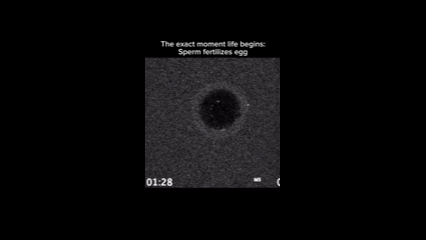In science, this metaphor parallels the “zinc spark”, which occurs when sperm fertilizes an egg, symbolizing divine creation. As a symbol of divine creation, the “spark of life” often conjures up images of a divine ignition during conception. This event is detected by advanced imaging and prevents sperm from entering the embryo, symbolizing a profound transition from potential to reality.
However, from a biblical viewpoint, this spark points to God’s sovereign act of creation. The Bible says that life begins at conception, imbued with divine purpose and sanctity, though interpretations differ.
God actively shapes and knows each person from the earliest stages, according to the biblical perspective. It’s beautifully illustrated in Psalm 139:13-16: “For you made my inward parts; you knit me together in my mother’s womb.” I praise you for making me so wonderfully and fearfully made… Your eyes saw my unformed substance; in your book they were written, every one of them, the days that were formed for me, when there were none yet.” In this passage, David acknowledges God’s intimate involvement in prenatal development, suggesting that personhood begins there. Similarly, Jeremiah 1:5 declares, “Before I formed you in the womb, I knew you, and before I gave you birth, I consecrated you; I named you a prophet to the nations.” According to this verse, foreknowledge and sanctification precede birth, with “formed in the womb” pointing to conception as the beginning of life.
The New Testament reinforces this through the account of John the Baptist in Luke 1:41-44. When Mary, pregnant with Jesus, greets Elizabeth, “the baby leaps in her womb” for joy, and Elizabeth gets filled with the Holy Spirit. As you can see in Luke 18:15, there’s no distinction between pre- and post-birth personhood since “brephos” is used for both.
As a result, these passages argue that life begins with fertilization, which is in accordance with scientific findings that a unique genetic identity forms during conception.
According to many Christian traditions, including evangelical and Catholic teaching, conception is when God gives life a soul. The doctrine of the Incarnation further supports it: Jesus’ human life began at conception in Mary’s womb (Luke 1:31-35), emphasizing that moment’s sanctity. In light of this perspective, ethical stances on abortion are based on the idea that the unborn are fully human, worthy of protection as God’s image-bearers (Genesis 1:27).
Christians don’t always agree that life starts at conception in the Bible. Some argue that it’s more like a gradual process than a precise one. To prove life starts at first breath, Genesis 2:7— “Then the Lord God formed the man from dust and breathed the breath of life into his nostrils, and he became a living creature.”
The proponents claim that this applies universally, meaning fetuses don’t fully exist until they’re born. This verse, however, isn’t typical human reproduction, which starts at conception, as in Genesis 4:1, but Adam’s unique creation from dust.
Historical theology lends itself to other views, noting early Church fathers like Tertullian linked ensoulment to conception, while Augustine pondered delayed animation. The passage Ecclesiastes 11:5—”You don’t know how the spirit comes to the bones in the womb”—suggests that the spirit enters later when the bones form. Progressive Christians point out that “life begins at conception” wasn’t an ancient slogan, but a slogan influenced by politics. According to them, the Bible doesn’t directly say life starts at conception, and verses like Exodus 21:22-25 suggest less value if you harm a fetus.
Despite these debates, the predominant biblical narrative affirms life’s value from the womb’s earliest moments, urging reverence for God’s creative work. The “spark of life” thus represents not just a biological event but a sacred divine endowment. In a world grappling with bioethics, Christians are called” Children are a heritage from the Lord,” says Psalm 127:3, a gift ignited at conception by the Lord’s hand. Children are a gift from the Lord,” a gift ignited by His hand at conception’s dawn.

